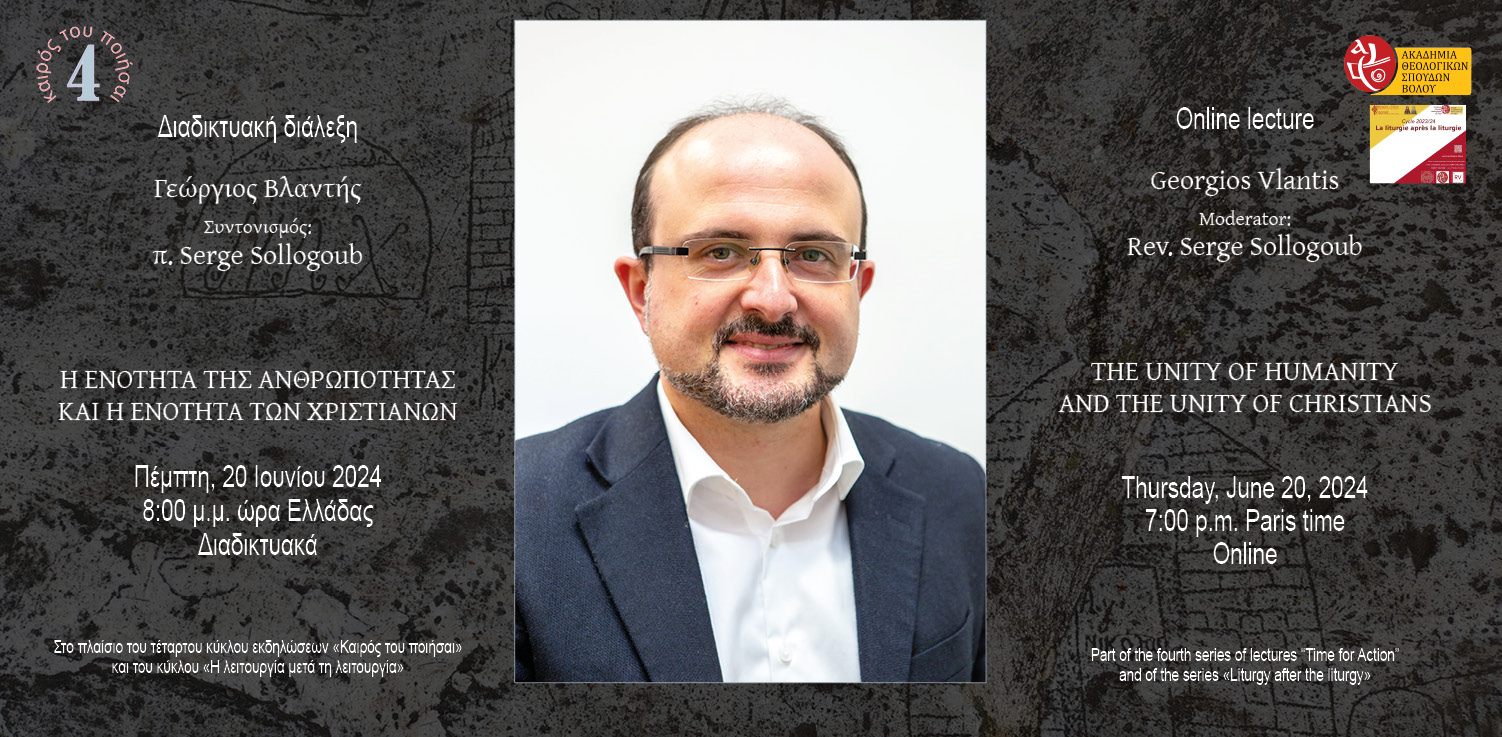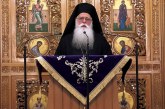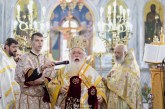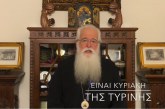
ENGLISH TEXT FOLLOWS
———————————————-
Διαδικτυακή διάλεξη – Γεώργιος Βλαντής: Η ΕΝΟΤΗΤΑ ΤΗΣ ΑΝΘΡΩΠΟΤΗΤΑΣ ΚΑΙ Η ΕΝΟΤΗΤΑ ΤΩΝ ΧΡΙΣΤΙΑΝΩΝ
Πέμπτη 20 Ιουνίου 2024, 8.00 μ.μ. ώρα Ελλάδας
Η τελευταία εκδήλωση του φετεινού κύκλου διαδικτυακών διαλέξεων «Καιρός του ποιήσαι» της Ακαδημίας Θεολογικών Σπουδών Βόλου θα πραγματοποιηθεί την Πέμπτη 20 Ιουνίου 2024, ώρα Ελλάδας 8:00 μ.μ., με ομιλητή τον Γεώργιο Βλαντή, MTh, Διευθυντή του Συμβουλίου των Χριστιανικών Εκκλησιών της Βαυαρίας και επιστημονικού συνεργάτη της Ακαδημίας Θεολογικών Σπουδών Βόλου. Το θέμα της διάλεξης θα είναι «Η ενότητα της ανθρωπότητας και η ενότητα των χριστιανών». Η διάλεξη θα δοθεί στα ελληνικά με μετάφραση στα γαλλικά, και ο συντονισμός της συζήτησης θα γίνει από τον πρωτοπρεσβύτερο π. Σέργιο Σολογκούμπ, υπεύθυνο για την κατήχηση ενηλίκων του Βικαριάτου. Ο σύνδεσμος για την παρακολούθηση μέσω της πλατφόρμας Zoom είναι https://us02web.zoom.us/j/84913433453.
Η διάλεξη θα είναι αφιερωμένη στη μνήμη του πρόσφατα εκλιπόντος (2.6.2024) π. Γεωργίου Τσέτση, Μεγάλου Πρωτοπρεσβυτέρου του Οικουμενικού Πατριαρχείου και αποτελεί επίσης μέρος του κύκλου «Η λειτουργία μετά τη λειτουργία» που διοργανώνεται από την Ιερά Μητρόπολη Γαλλίας και το Βικαριάτο των γαλλόφωνων ενοριών (Vicariat Sainte Marie de Paris et Saint Alexis d’Ugine, Οικουμενικό Πατριαρχείο) σε συνεργασία με την Ακαδημία Θεολογικών Σπουδών Βόλου.
Η ενότητα των ανθρώπων αποτελεί για τους χριστιανούς ταυτοχρόνως δεδομένο, το οποίο βασίζεται στην κοινή φύση, αλλά και ζητούμενο, καθώς πολυποίκιλες διαιρέσεις (ομολογιακές, θρησκευτικές, πολιτικές, εθνικές, οικονομικές κ.ο.κ.) όχι σπάνια οδηγούν σε οξείες, ακόμη και θανατηφόρες συγκρούσεις. Η ενότητα είναι δώρο του τριαδικού Θεού, δημιουργού της ανθρωπότητας και οδηγού στην εσχατολογική της ολοκλήρωση, συνάμα όμως και Κυριακή εντολή, η οποία οφείλει να συνιστά οδοδείκτη της ιστορικής πορείας της Εκκλησίας. Τί σημαίνει η παραδοχή της οντολογικής ενότητας της ανθρωπότητας για το χριστιανικό ήθος, αλλά και για τη σχέση της ορθόδοξης Εκκλησίας με τους ετεροδόξους, τα ποικίλα θρησκεύματα, τον εκκοσμικευμένο άνθρωπο και την κτίση στην ολότητά της; Υπάρχει χώρος για την ετερότητα στο εκκλησιαστικό όραμα της ενότητας, ή μήπως αυτό δεν είναι παρά μια αφελής εξιδανίκευση, η οποία, μέσα στην ανιστορικότητά της, δεν αντέχει την ένταση της διαφορετικότητας; Πότε το πρόταγμα της Oρθοδοξίας γίνεται αιτία διαβολής, πρόξενος διάσπασης, τροφοδότης του φονταμενταλισμού;
O Γεώργιος Βλαντής γεννήθηκε στην Αθήνα το 1980. Σπούδασε θεολογία στο Πανεπιστήμιο Αθηνών. Πραγματοποίησε μεταπτυχιακές σπουδές στη Συστηματική Θεολογία και τη Φιλοσοφία της Θρησκείας στα Πανεπιστήμια Αθηνών και Μονάχου. Από το 2012 είναι επιστημονικός συνεργάτης της Ακαδημίας Θεολογικών Σπουδών Βόλου. Από τον Μάιο του 2016 είναι Διευθυντής (Geschäftsführer) του Συμβουλίου των Χριστιανικών Εκκλησιών της Βαυαρίας (Arbeitsgemeinschaft Christlicher Kirchen in Bayern). Από το 2021 ανήκει στην ομάδα των εκδοτών του περιοδικού Ökumenische Rundschau. Συμμετέχει σε ποικίλα όργανα της οικουμενικής κίνησης στη Γερμανία και σε άλλες χώρες (π.χ. μέλος της Επιτροπής του αυστριακού Ιδρύματος Pro Oriente για τον Διάλογο Ορθοδόξων και Ρωμαιοκαθολικών). Δημοσίευσε πολλά άρθρα σε θέματα φιλοσοφίας της θρησκείας, ιστορίας της θεολογίας και οικουμενικής θεολογίας στα ελληνικά, γερμανικά, αγγλικά και ιταλικά, π.χ. για τον αποφατισμό, τις πατερικές θεωρήσεις του αθεϊσμού, την πρόσληψη των οικουμενικών κειμένων, την Αγία και Μεγάλη Σύνοδο της Ορθοδόξου Εκκλησίας, την αυτοκεφαλία της Εκκλησίας της Ουκρανίας, τον ορθόδοξο φονταμενταλισμό και τη σχέση Ορθοδοξίας και νεωτερικότητας. Επίσης, μετέφρασε βιβλία και άρθρα από και προς τα ελληνικά, γερμανικά και αγγλικά. Στις 31 Αυγούστου 2023 η Α.Θ.Π., ο Οικουμενικός Πατριάρχης Βαρθολομαίος, του απένειμε το οφφίκιο του Άρχοντος Ιερομνήμονος της Αγίας του Χριστού Μεγάλης Εκκλησίας. Ανάμεσα στα δημοσιεύματα του περιλαμβάνονται: Karl Barth, Η Προς Ρωμαίους Επιστολή (1922), μετάφραση στα ελληνικά, Αθήνα 2015· “The Issue of Ecumenical Reception in Orthodox Churches and Theological Institutions” στο Pantelis Kalaitzidis, Thomas FitzGerald, Cyril Hovorun, Aikaterini Pekridou, Nikolaos Asproulis, Dietrich Werner & Guy Liagre (επ.), Orthodox Handbook on Ecumenism: Resources for Theological Education, Βόλος 2014, σσ. 813-821· “Images of Holiness that Do Harm”, Communio Viatorum 61 (2019) 1, σσ. 99-109· „Die Sorge des Hirten – Konstantinopels Handeln in der Ukraine-Frage“, Religion und Gesellschaft in Ost und West 48.1 (1.2020) σσ. 19-23· „Pneumatologie und Eschatologie in der zeitgenössischen orthodoxen Theologie. Richtlinien und Perspektiven“ στο Petra Bosse-Huber, Konstantinos Vliagkoftis & Wolfram Langpape (επ.), Wir glauben an den Heiligen Geist. XII. Begegnung im bilateralen theologischen Dialog zwischen der EKD und dem Ökumenischen Patriarchat, Leipzig 2021, σσ. 119-137.
———————————————-
Online lecture
Georgios Vlantis
THE UNITY OF HUMANITY
AND THE UNITY OF CHRISTIANS
Thursday, June 20, 2024, 8 p.m. (Athens time)
On Thursday, June 20th, 2024, at 8 p.m., the fourth series of Volos Academy for Theological Studies online series “Time for action” will conclude with a lecture entitled “The Unity of Humanity and the Unity of Christians” by Georgios Vlantis, MTh, Director of the Ecumenical Council of Churches in Bavaria, Germany, and Research Associate at Volos Academy. This lecture is presented in collaboration with the series “Liturgy after the Liturgy”, co-sponsored by Volos Academy and the Holy Metropolis of France and the Vicariate of French-Speaking Parishes (Vicariat Sainte Marie de Paris et Saint Alexis d’Ugine, Ecumenical Patriarchate). The lecture will be presented in Greek with live interpretation into French, and moderated by Protopresbyter Rev. Serge Sollogoub, head of adult catechism for the Vicariat. The link for attending via the Zoom platform is https://us02web.zoom.us/j/84913433453. This lecture is dedicated to the memory of the recently deceased (Jun. 2, 2024) Rev. George Tsetsis, Great Protopresbyter of the Ecumenical Patriarchate.
In light of the foundational Christian belief that human beings share a common nature, the unity of human beings is a given for Christians. It is also, however, a requirement, since divisions (confessional, religious, political, national, economic, etc.) sometimes lead to painful and even deadly conflicts. Unity is a gift of the triune God, who has created humanity and leads it towards its eschatological fulfillment. It is also a commandment of the Lord, intended as a compass for the Church’s life in history. What does this ontological unity of humanity mean? This question pertains not only to Christian ethos, but also to the relationship of the Orthodox Church with the heterodox Christians, world religions, secularized society, and creation in its entirety. Is there room for diversity in the Church’s vision of unity, or is this vision nothing but a naive idealization, which, in its ahistorical reality, cannot bear the intensity of diversity? At what point does the requirement for orthodoxy become a cause of defamation and division, a fomenter of fundamentalism?
Georgios Vlantis was born in Athens, Greece, in 1980. He studied in Athens and Munich. He holds a BA in Theology and a Masters in Comparative Philosophy of Religion. Since 2012 he has been an associate of the Volos Academy for Theological Studies. He has published articles on various issues pertaining to philosophy of religion, history of theology, and ecumenism, in Greek, German, English and Italian, e.g. on apophaticism, patristic considerations of atheism, reception of ecumenical documents, the Holy and Great Council of Crete, Ukrainian autocephaly, Orthodox fundamentalism, and Orthodoxy and modernity. He has translated books and articles into Greek, German and English and is active in various ecumenical forums in Germany and beyond (e.g. member of the Pro Oriente Steering Committee for the Orthodox-Catholic Dialogue). Since May 2016 he has been the Director (Geschäftsführer) of the Ecumenical Council of Churches in Bavaria (Arbeitsgemeinschaft Christlicher Kirchen in Bayern), Germany. His publications include: Karl Barth, The Epistle to the Romans (1922), translation into Greek, Athens 2015; “The Issue of Ecumenical Reception in Orthodox Churches and Theological Institutions”, in Pantelis Kalaitzidis, Thomas FitzGerald, Cyril Hovorun, Aikaterini Pekridou, Nikolaos Asproulis, Dietrich Werner & Guy Liagre (eds.), Orthodox Handbook on Ecumenism — Resources for Theological Education, Volos 2014, pp. 813-821; “Images of Holiness that Do Harm”, Communio Viatorum 61(2019) 1, pp. 99-109; „Die Sorge des Hirten – Konstantinopels Handeln in der Ukraine-Frage“, Religion und Gesellschaft in Ost und West 48.1 (1.2020), pp. 19-23; Pneumatologie und Eschatologie in der zeitgenössischen orthodoxen Theologie. Richtlinien und Perspektiven“ in Petra Bosse-Huber, Konstantinos Vliagkoftis & Wolfram Langpape (eds.), Wir glauben an den Heiligen Geist. XII. Begegnung im bilateralen theologischen Dialog zwischen der EKD und dem Ökumenischen Patriarchat, Leipzig 2021, pp. 119-137.




